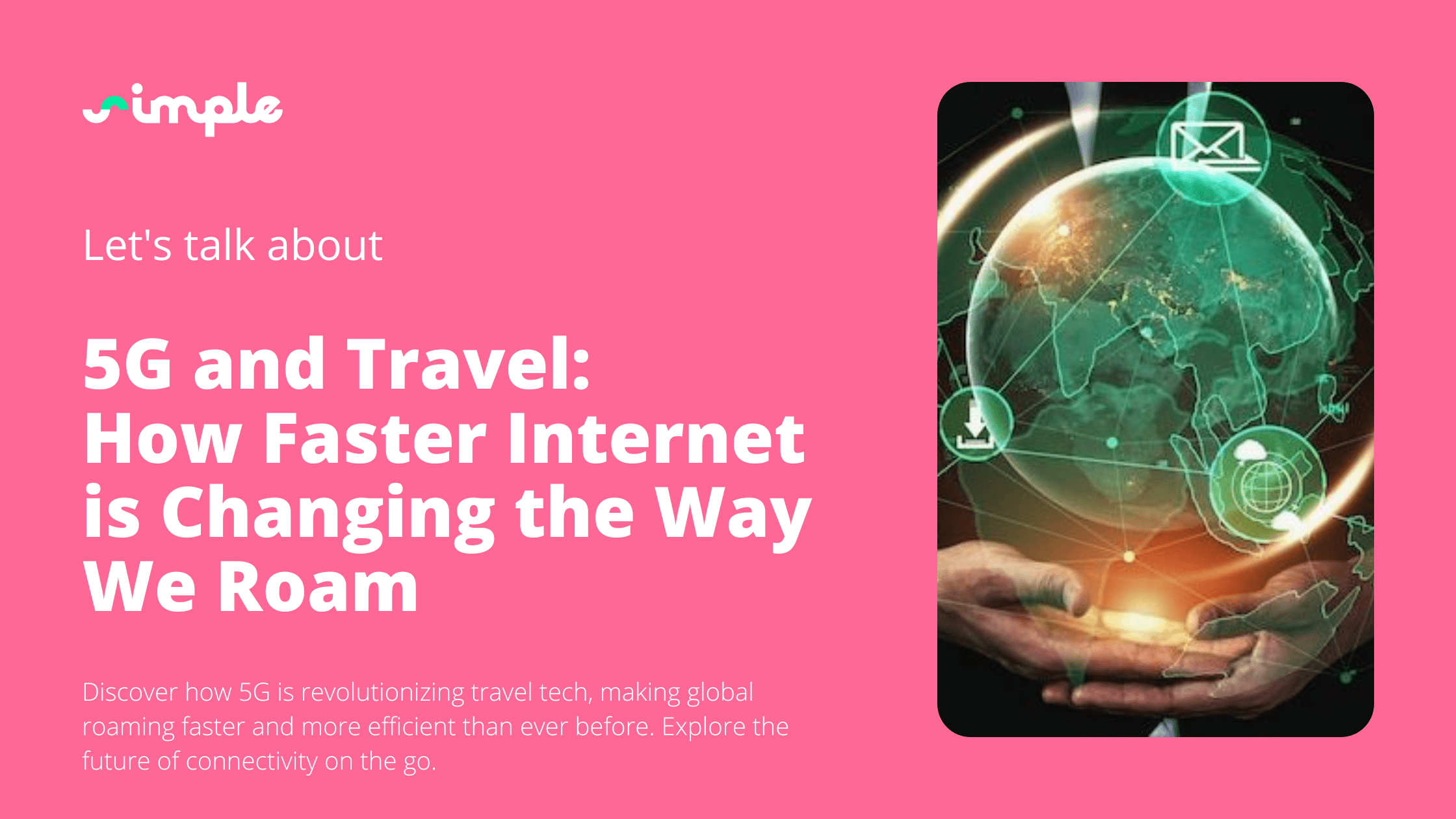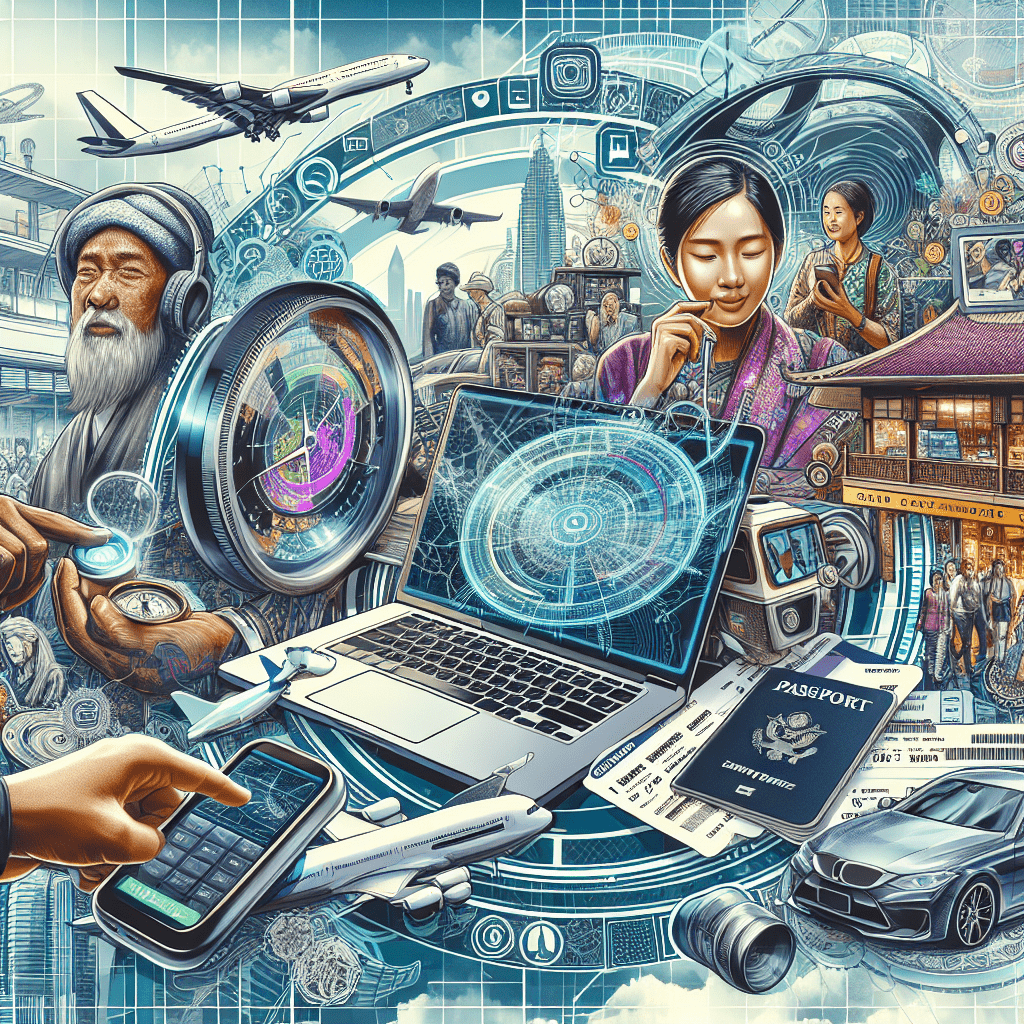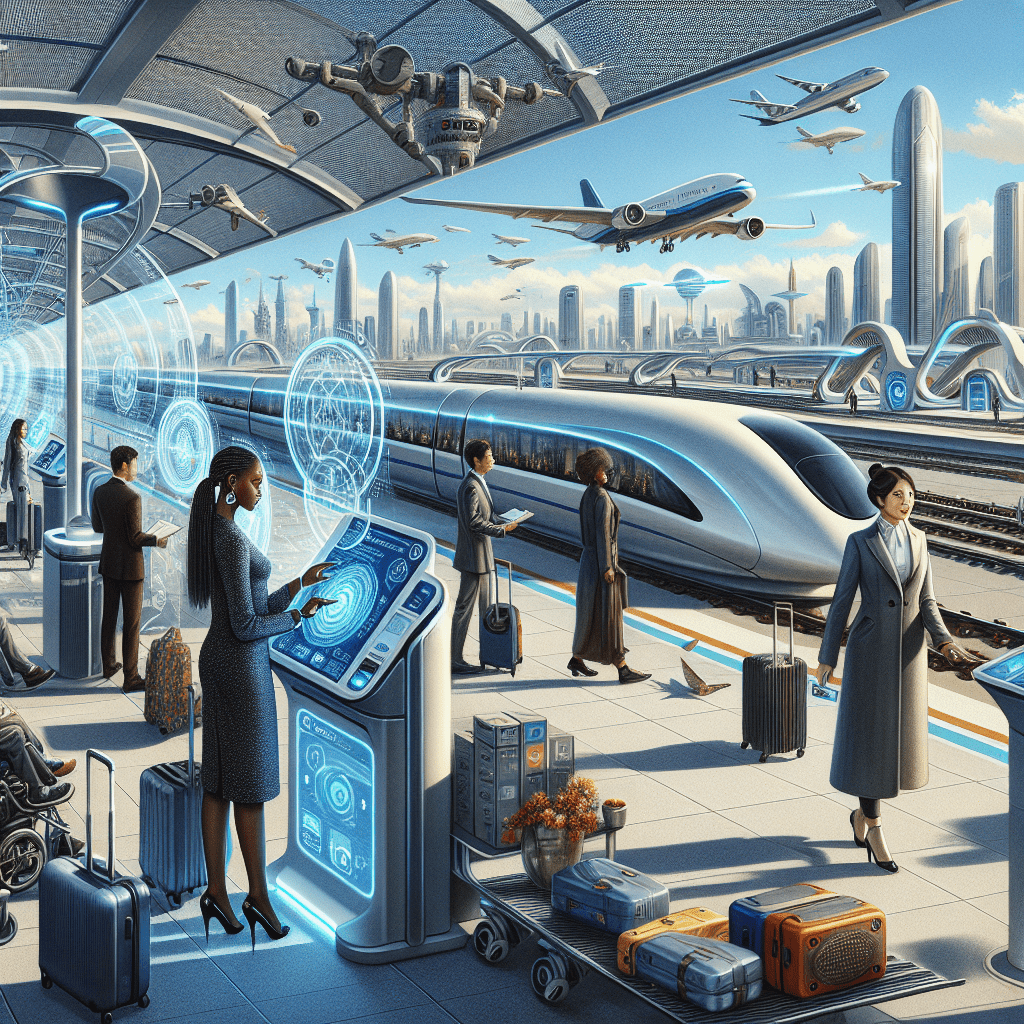5G and Travel: How Faster Internet is Changing the Way We Roam

The advent of 5G technology marks a significant leap forward in the realm of connectivity, promising to revolutionize various industries, including travel. As the fifth generation of mobile networks, 5G offers unprecedented speed and reliability, enabling seamless communication and data transfer. This transformative potential is particularly impactful for the travel industry, where connectivity is crucial for both service providers and travelers. With 5G, the integration of digital travel tools and smart travel gadgets becomes more efficient, enhancing the overall travel experience.
Faster internet speeds provided by 5G are set to redefine how global travelers plan, book, and experience their journeys. From real-time updates on travel management software to immersive virtual travel experiences, the possibilities are vast. The travel industry is poised to leverage these advancements, offering more personalized and streamlined services. As travelers increasingly rely on mobile travel apps and online booking platforms, the role of 5G becomes even more critical. For those interested in exploring the latest in travel tech, understanding the impact of 5G is essential. The significance of faster internet for global travelers cannot be overstated, as it enhances connectivity, reduces latency, and supports a more dynamic and interactive travel experience.

Enhanced Connectivity and Communication
Real-time Language Translation Improvements
The introduction of 5G technology is set to revolutionize real-time language translation, a critical tool for global travelers navigating diverse linguistic landscapes. With the increased speed and reduced latency that 5G offers, applications and devices can now provide immediate and accurate translations, significantly enhancing cross-cultural interactions. This advancement is particularly beneficial in scenarios where language barriers have traditionally posed challenges, such as in international business meetings or when seeking assistance in foreign countries.
Smart travel gadgets equipped with 5G capabilities can now process complex language data almost instantaneously, allowing travelers to communicate more effectively and confidently. This is a game-changer for both personal and professional interactions, as it reduces misunderstandings and fosters a more inclusive environment. The integration of AI in the travel industry further enhances these capabilities, as AI-powered translation tools become more sophisticated and context-aware, providing translations that are not only accurate but also culturally sensitive.
Applications benefiting from 5G’s speed include mobile travel apps that offer real-time translation services, enabling travelers to access information and communicate with locals effortlessly. This seamless communication is crucial for enhancing the travel experience, making it more enjoyable and less stressful. As 5G networks continue to expand globally, the potential for real-time language translation improvements will only grow, offering travelers a more connected and immersive experience.
Superior Video Calling Quality
5G technology is also transforming the quality of video calls, a vital communication tool for travelers who need to maintain personal and professional connections while on the move. The high-definition video calls enabled by 5G provide a level of clarity and reliability that was previously unattainable with older network technologies. This improvement is particularly significant for remote workers who rely on video conferencing to collaborate with colleagues across different time zones.
With 5G, travelers can enjoy uninterrupted video calls with minimal lag, making it easier to stay connected with family and friends back home. The enhanced video quality also supports the growing trend of digital nomadism, where individuals work remotely while traveling the world. As more travelers embrace this lifestyle, the demand for reliable and high-quality video communication will continue to rise, further driving the adoption of 5G technology.
Moreover, the superior video calling quality facilitated by 5G extends beyond personal use. Businesses in the travel industry can leverage this technology to offer virtual travel experiences, allowing potential customers to explore destinations through immersive video tours before making a booking. This innovative approach not only enhances customer engagement but also provides a competitive edge in a rapidly evolving market.
Simplified Travel Planning Through Instant Information Access
One of the most significant benefits of 5G technology for travelers is the ability to access real-time information instantly. This capability simplifies travel planning by providing travelers with up-to-date travel updates and the ability to make booking adjustments on the fly. Whether it’s checking flight statuses, finding alternative routes, or booking last-minute accommodations, the speed and reliability of 5G networks ensure that travelers have the information they need at their fingertips.
The integration of AI travel assistants into travelers’ routines is another area where 5G is making a substantial impact. These digital travel tools can analyze vast amounts of travel data analytics in real-time, offering personalized recommendations and insights that enhance the travel experience. From suggesting the best local restaurants to providing weather updates, AI travel assistants powered by 5G are becoming indispensable companions for modern travelers.
Furthermore, the seamless integration of travel management software with 5G networks allows for more efficient coordination of travel itineraries. Automated travel services can now operate with greater precision, ensuring that travelers receive timely notifications and updates. As the travel industry continues to embrace travel tech innovations, the role of 5G in simplifying travel planning and enhancing the overall travel experience will become increasingly prominent.

Revolutionizing Travel Experiences
Augmented Reality (AR) and Virtual Reality (VR) Advancements
The integration of 5G technology is significantly advancing the capabilities of Augmented Reality (AR) and Virtual Reality (VR) in the travel industry. These technologies are transforming how travelers experience destinations, offering innovative ways to explore and interact with their surroundings. AR applications, for instance, are enhancing sightseeing and navigation by overlaying digital information onto the physical world. Travelers can use their smartphones or smart travel gadgets to access detailed information about landmarks, historical sites, and cultural attractions in real-time, enriching their understanding and appreciation of the places they visit.
Virtual Reality, on the other hand, is providing travelers with the opportunity to embark on virtual tours before committing to actual travel. This is particularly beneficial for those who wish to explore potential destinations from the comfort of their homes. VR experiences allow users to immerse themselves in a destination’s environment, offering a taste of what to expect and aiding in travel decision-making. As 5G networks continue to expand, the quality and accessibility of these virtual travel experiences will improve, making them more immersive and realistic.
These advancements in AR and VR are not only enhancing the travel experience for consumers but also providing travel tech startups with new opportunities to innovate. By leveraging 5G’s capabilities, these companies can develop cutting-edge travel technology solutions that cater to the evolving needs of modern travelers. As a result, the travel industry is witnessing a surge in travel tech trends that prioritize immersive and interactive experiences.
Faster Access to Cloud-Based Services
5G technology is revolutionizing access to cloud-based services, a critical component of modern travel. With faster upload and download speeds, travelers can seamlessly store and retrieve travel documents, photos, and other essential files from the cloud. This capability is particularly advantageous for those who rely on digital travel tools to manage their itineraries and access important information on the go.
Cloud storage improvements facilitated by 5G ensure that travelers can quickly and efficiently upload large files, such as high-resolution images and videos, without experiencing delays. This is especially beneficial for travel bloggers and content creators who need to share their experiences in real-time. Additionally, the enhanced security and accessibility of personal travel data provided by cloud services offer peace of mind to travelers, knowing that their information is protected and readily available whenever needed.
The travel industry is also benefiting from the integration of cloud-based travel management software, which streamlines operations and enhances customer service. Automated travel services can now operate more efficiently, providing travelers with timely updates and personalized recommendations. As 5G networks continue to expand, the reliance on cloud-based services will grow, further driving the adoption of travel tech innovations that enhance the overall travel experience.
Boosting Smart Tourism Through Interconnected Devices
The proliferation of Internet of Things (IoT) devices in the travel industry is paving the way for smart tourism, where interconnected devices enhance the travel experience. 5G technology plays a crucial role in this transformation by providing the robust network infrastructure needed to support a wide array of IoT applications. In the hospitality sector, IoT devices are being used to create personalized guest experiences, from smart room controls to automated check-in processes.
Smart city initiatives are also being streamlined through the deployment of 5G networks, enabling cities to offer more efficient and sustainable tourism services. These initiatives include smart transportation systems, real-time traffic management, and enhanced public safety measures, all of which contribute to a more enjoyable and hassle-free travel experience. As cities continue to adopt smart technologies, travelers can expect more seamless and integrated services that cater to their needs.
The impact of 5G on smart tourism extends beyond individual travelers, as it also provides travel tech startups with opportunities to develop innovative solutions that address the challenges of modern travel. By leveraging the capabilities of 5G, these companies can create new products and services that enhance connectivity, improve efficiency, and offer personalized experiences. As a result, the travel industry is witnessing a shift towards more interconnected and intelligent travel solutions that cater to the demands of today’s tech-savvy travelers.
Operational and Structural Benefits for the Travel Industry

Improved Logistics and Real-Time Tracking for Transport Services
The implementation of 5G technology is bringing about significant improvements in logistics and real-time tracking for transport services within the travel industry. Airlines and railway systems are leveraging the enhanced connectivity and speed of 5G to optimize their operations and services. This includes more efficient scheduling, better resource allocation, and improved communication between different parts of the transport network. With 5G, transport services can provide real-time updates to passengers, ensuring a smoother and more reliable travel experience.
One of the key areas where 5G is making a substantial impact is in baggage handling and tracking systems. Precision in these systems is crucial for minimizing delays and ensuring that luggage reaches its intended destination without issues. With 5G-enabled smart travel gadgets, travelers can track their baggage in real-time, reducing the anxiety associated with lost or delayed luggage. This level of precision and transparency is transforming how transport services manage logistics, leading to higher customer satisfaction and operational efficiency.
Moreover, the integration of Internet of Things travel solutions with 5G networks allows for more sophisticated tracking and monitoring of transport assets. This capability is particularly beneficial for logistics companies that need to manage large fleets of vehicles or coordinate complex supply chains. As 5G networks continue to expand, the travel industry will see further enhancements in logistics and real-time tracking, ultimately leading to more efficient and reliable transport services.
Advanced Data Analysis for Better Service Delivery
5G technology is also revolutionizing the way the travel industry utilizes data to enhance service delivery. With the ability to process large volumes of data quickly and efficiently, travel companies can leverage big data to predict travel trends and preferences. This capability allows for more informed decision-making and the development of tailored offers and packages that cater to the specific needs and desires of travelers.
Travel data analytics powered by 5G enables companies to gain deeper insights into customer behavior, allowing them to personalize their services and improve customer satisfaction. For instance, online booking platforms can use data analysis to recommend destinations, accommodations, and activities based on a traveler’s past preferences and behaviors. This level of personalization is becoming increasingly important in a competitive market where travelers expect customized experiences.
Additionally, the integration of AI in the travel industry is further enhancing data analysis capabilities. AI algorithms can process and interpret complex data sets, providing actionable insights that drive innovation and improve service delivery. As 5G networks continue to support these advanced data analysis tools, the travel industry will be better equipped to meet the evolving demands of modern travelers, offering more personalized and efficient services.
Enhanced Safety and Cybersecurity Measures
As the travel industry becomes increasingly digital, the importance of safety and cybersecurity measures cannot be overstated. 5G technology is playing a crucial role in enhancing these measures, providing the infrastructure needed to implement advanced security protocols. With 5G, travel companies can ensure that their digital travel transactions are secure, protecting both their operations and their customers’ sensitive information.
The implementation of advanced security protocols with 5G capabilities includes measures such as encryption, multi-factor authentication, and real-time threat detection. These protocols are essential for safeguarding against cyber threats, which are becoming more sophisticated and prevalent in the digital age. By leveraging 5G technology, travel companies can enhance their cybersecurity posture, reducing the risk of data breaches and other security incidents.
Furthermore, the increased protection against cyber threats extends to the use of blockchain in travel, which offers a decentralized and secure way to manage transactions and data. As 5G networks continue to expand, the travel industry will be better positioned to implement these innovative security solutions, ensuring that travelers can enjoy a safe and secure experience. The enhanced safety and cybersecurity measures provided by 5G are essential for building trust and confidence among travelers, ultimately contributing to the industry’s growth and success.
Simplify Your Travel with Simplevisa
Fast, secure visa applications online
As 5G technology transforms the travel industry, Simplevisa is leveraging the benefits of faster connectivity to streamline your visa application process. With enhanced internet speeds and real-time updates, applying for your visa online has never been easier. Our platform ensures a seamless and secure experience, enabling you to focus on your journey while we handle the paperwork. Visit simplevisa.net today and apply for your visa with the speed and reliability of 5G technology, setting you on the path to your next adventure.
Conclusion

The advent of 5G technology is undeniably shaping the future of travel, offering transformative benefits that enhance the overall experience for travelers. With its unparalleled speed and connectivity, 5G is revolutionizing various aspects of the travel industry, from improving logistics and real-time tracking to advancing data analysis and enhancing safety measures. Travelers now enjoy more seamless and personalized experiences, thanks to the integration of digital travel tools and smart travel gadgets that leverage 5G’s capabilities. The ability to access real-time information, enjoy high-quality video calls, and experience immersive virtual travel experiences are just a few examples of how 5G is redefining the way we roam.
Moreover, the operational and structural benefits provided by 5G are enabling travel companies to optimize their services and deliver more efficient and reliable solutions. The integration of AI in travel industry operations, coupled with advanced data analytics, allows for more informed decision-making and the development of tailored offerings that cater to individual traveler preferences. As 5G networks continue to expand globally, the travel industry is poised to embrace even more innovative travel tech solutions that enhance connectivity, improve efficiency, and offer personalized experiences.
As we look to the future, the ongoing impact of 5G adoption in global travel technology evolution is set to be profound. The travel industry is on the cusp of a new era, where interconnected devices and advanced technologies work in harmony to create a more dynamic and interactive travel experience. The potential for further innovation is vast, with travel tech startups and established companies alike exploring new ways to leverage 5G’s capabilities. From blockchain in travel to the Internet of Things travel solutions, the possibilities are endless.
Ultimately, the adoption of 5G technology is not just about faster internet speeds; it’s about creating a more connected and efficient world where travelers can explore with ease and confidence. As the travel industry continues to evolve, the role of 5G will be instrumental in driving progress and shaping the future of travel. The journey towards a more technologically advanced travel experience is just beginning, and the impact of 5G will undoubtedly be felt for years to come.